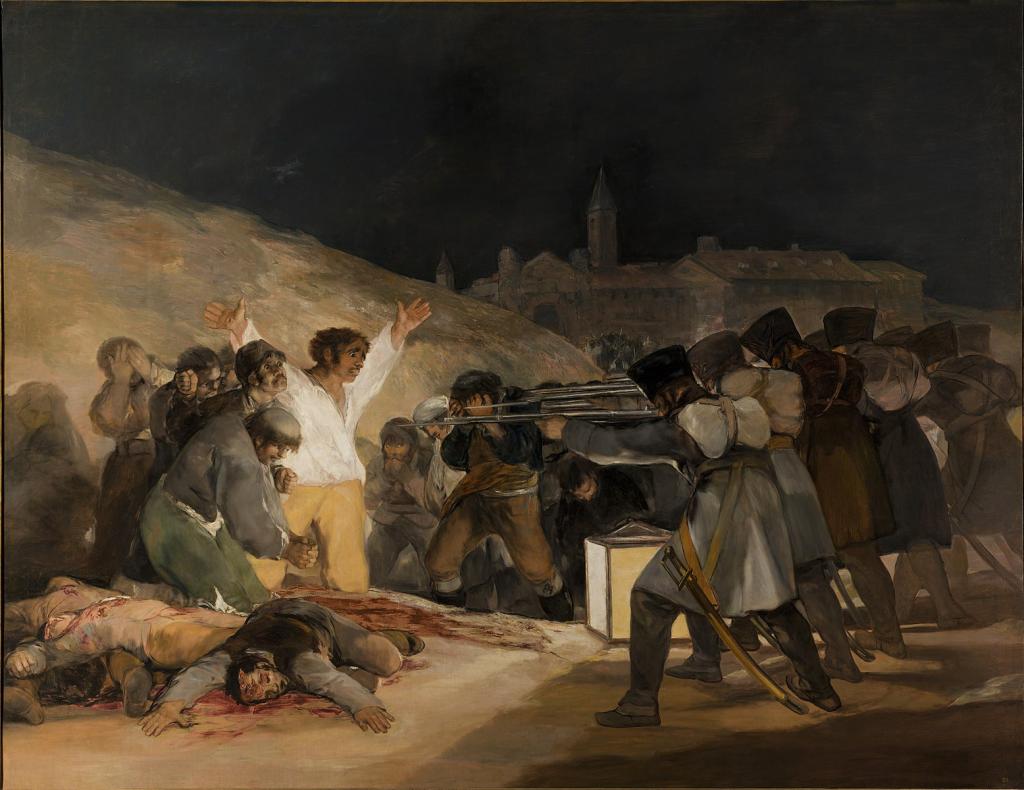
(Wikimedia Commons public domain image)
In my immediately preceding blog entry (“Napoleon, en route to Egypt”), I indicated my disapproval of Napoleon’s overweening ambition and his lust for land and “glory” through violent military conquest. In Europe’s Napoleonic Wars alone, which commenced in 1803, five years after his 1798 invasion of Egypt, and culminated in his defeat at Waterloo and his exile to the remote south Atlantic island of Saint Helena in 1815, it is estimated that between 3,250,000 and 6,500,000 people were killed — at a time when the entire population of western Europe (including distant Scandinavia) was probably about 110,000,000.
It isn’t, however, merely that I disapprove of Napoleon, or that I dislike him. I dislike coconut. My disapproval of Napoleon is a very different matter. I disapprove of him not merely personally, as I personally disapprove of Billy Ray Cyrus’s “Achy Breaky Heart” and Bobby McFerrin’s “Don’t Worry, Be Happy,” but morally. And that is a quite distinct thing. I don’t expect or require that others dislike coconut, as I do. (I realize that certain forms of madness or personality defect are socially acceptable and not morally culpable.) But I do expect that others would disapprove of the cavalier way in which Napoleon disposed of millions of lives in order to gratify his own ambition. And I would consider it a grave character flaw if anybody didn’t. (If you’re French or of French extraction and that clouds your vision of Napoleon, feel free to substitute Hitler or Stalin for His Imperial and Royal Majesty Napoleon I, By the Grace of God and of the Constitutions of the Empire, Emperor of the French, King of Italy, Mediator of the Swiss Confederation, Protector of the Confederation of the Rhine, and Co-Prince of Andorra.)
Why the difference?
When a pride of lions attacks a herd of gazelles, we may well feel pity for the hapless gazelles. But we don’t morally condemn the lions as wrongdoers. They are simply doing what nature makes them do. Their feeding on gazelles has no more moral significance than the gazelles’ feeding on grass and bushes does.
Moreover, I doubt that any other lions, watching the attack, feel moral indignation at what they’re seeing. Nor do any of the participating lions feel moral qualms about what they’re doing.
Even the gazelles aren’t indignant about the lions’ aggression. I’m sure that they dislike it, probably even more fervently than I dislike coconut and “Achy Breaky Heart.” But they have no moral reservations about it. They don’t condemn the aggressiveness of lions on moral grounds, any more than we do.
In our fallen world, this is simply the way things are. Carnivores eat herbivores, the fast pursue the slow, the strong overcome the weak. Animals take what they can get.
Bacteria will eat just about anything, and have been doing so for billions of years. Oxygen rusts iron. The coronavirus spreads by means of, and at the expense of, its hosts.
Such things are often unpleasant or undesirable, and on many occasions, we try to stop them. But we don’t erupt in moral indignation.
Why, though, do we judge many human acts to be not merely unpleasant but wrong? We feel moral revulsion at any man or woman who simply takes whatever he or she can get. If a lion violently rips the throat of a baby elephant and kills it, we’re saddened, but we’re not indignant. If a human were to do exactly the same thing, very few of us wouldn’t be morally indignant. And we would consider those who weren’t to be defective, even mentally ill.
But why?
Where do these “moral standards” come from? And why should we pay any attention to them? Or should we? For that matter, what does should even mean in such matters?
Reflection on these and related questions is, in my view, quite important and potentially very instructive.












